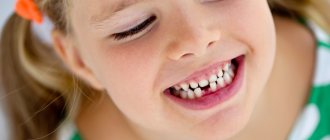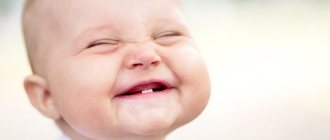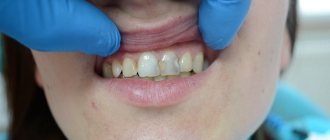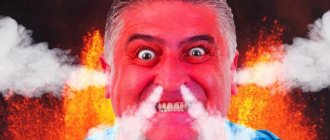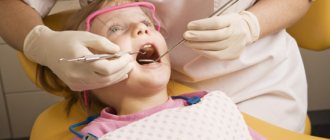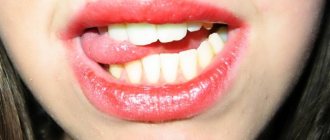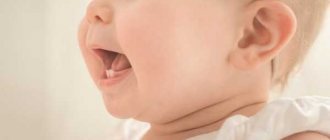If your child grinds his teeth in his sleep
In medicine, teeth grinding is called bruxism - unconscious compression of teeth, accompanied by their creaking, which is not associated with the chewing function of the dental system. If a child grinds his teeth in his sleep, this is not at all a sign of any disease. In most cases, bruxism goes away on its own as the baby gets older, but this does not mean that the problem can be left to chance.
Teeth grinding is observed both in healthy babies and in children with certain developmental defects or pathologies. Experts note several factors that influence the child and provoke the occurrence of bruxism. These include:
- the child has experienced regular stressful situations or systematic fatigue;
- the presence of inflammatory processes associated with adenoids;
- first signs of epilepsy;
- the process of formation of bite pathology;
- teething.
A detailed consideration of all these factors will help to understand the causes of bruxism.
Creaking due to frequent stressful situations
The child’s still unstable nervous system reacts to the slightest factors of excitement, which for adults may seem like a trifle. For example:
- quarrel with peers;
- change of school or kindergarten;
- increased activity of the child before going to bed;
- visit of guests.
Children also react strongly emotionally to their parents’ screams. This can be either a shout at a child or a quarrel between adults. Computer games also have a negative impact on the child’s psyche.
The baby’s emotional excitement is manifested by involuntary clenching of the dental system, causing teeth grinding. However, it should be noted that if a child grinds his teeth due to nervous tension or fatigue, then bruxism also manifests itself in the daytime. This is caused by constant overstrain of the nervous system.
Stressful situations also include cases when a baby is weaned from breastfeeding. The sucking reflex + a stressful situation causes temporary bruxism in the baby. By the age of three, symptoms disappear.
Bruxism due to sleep disturbance
Pathological sleep disturbance is the most common cause of pathology. Grinding of teeth occurs for the same reasons as in the first case - the baby’s body is not able to relax. At such moments, the child experiences changes in breathing, pulse and blood pressure. Other manifestations of sleep disturbance: talking in the middle of the night, screaming and somnambulism (popularly sleepwalking).
For infants, teeth grinding due to sleep disturbances is difficult to recognize. There may be other reasons here as well. But in older children, these disorders can be reinforced by nightmares. The child experiences unexplained awakenings and problems falling asleep. Such an emotional state of the child should be a reason to visit a neurologist.
Teeth grinding due to teething
Bruxism due to teething is observed in babies up to one year old. During this period, the baby’s gums become very swollen, inflamed and itchy. Therefore, the resulting creaking can be considered attempts to scratch the gums. After all the teeth have erupted, the symptoms disappear. Another feature of this reason is that there is no creaking during the daytime. This is explained by the fact that the baby consciously scratches his gums with toys or pens.
Problems with the nasopharynx
The problem with creaking may arise due to the presence of an inflammatory process in the adenoids. As a result of this process, the baby’s nasal passages are blocked, which means their air passage is disrupted. Symptoms of such disorders are snoring and bruxism.
Maxillofacial pathologies in the form of malocclusions
In children over 3 years old, teeth grinding can be reproduced due to disorders of the dental system. These disorders include any type of pathological bite. Obliquely or crookedly growing dental units do not touch each other correctly, and excessive density of contact contributes to the reproduction of grinding. To solve the problem, you will need to consult a dentist (or orthodontist).
Bruxism due to muscle tension
When there is a lack of important elements in the human body in the form of calcium, magnesium and B vitamins, convulsive muscle contractions are reproduced. This symptom can manifest itself in all muscle groups, which include the jaw.
Bruxism is inherited
Some experts claim that bruxism is hereditary. It is not worth talking with certainty about genetic predisposition, since this pattern has not been fully studied.
Association between teeth grinding at night in children and epilepsy
Sometimes, when parents complain about grinding their teeth, doctors recommend checking the baby for epilepsy. Such a decision is quite justified. The fact is that the signs of epileptic seizures are not always clearly expressed and noticeable to others. Sometimes only severe teeth grinding can be a symptom of a minor attack. A qualified neurologist can refute or confirm the existence of a connection between bruxism and epilepsy.
Reliability of information about the connection between helminthic infestation and teeth grinding in children
To some extent, our grandmothers are right when they claim that teeth grinding at night is evidence of the presence of worms in a small body. The accumulation of parasites in the biliary tract and intestines can cause inflammation, which provokes peristalsis (wave-like contractions). This provokes involuntary closure of the jaw muscles. But helminthiasis of such a severe degree is difficult to encounter these days, especially in developed countries.
Sometimes the nighttime creaking is repeated during the day. This also needs to be taken into account before deciding whether to treat or ignore the problem.
Preventive measures
It has already been said above about organizing a healthy home environment, but this is not the only way parents can support their child.
What else can be done to eliminate and prevent bruxism:
- impose a ban on active evening games and take walking as a rule so that the baby can fully rest and get enough sleep
- organize a complete diet and do not forget about the benefits of solid food for both the jaw and stomach
- give vitamin complexes to compensate for the lack of nutrients
It is also recommended to teach the child to control his emotions and ensure that, when free, the jaws do not close when the mouth is closed.
Even if you notice signs of daytime teeth grinding, there is no need to panic. A rational approach to the issue and timely diagnosis is already half the success.
Daytime teeth grinding in a child
Sometimes parents turn to the pediatrician with the problem of their baby grinding his teeth during the day. In such a situation, you need to pay attention - only during the day the child reproduces the grinding of his teeth or even during sleep. The cause of the problem should be looked for when the creaking repeats at night. If the baby squeaks during the day, then this is rather a bad habit that he could see somewhere and try on his own. In this case, weaning him from his bad habit will be very problematic. Most likely, the baby liked the process and it does not cause any pain. In this situation there are two ways out.
- You can resort to punishments that are acceptable in the family, since stories about damaged enamel and harm to the body will most likely fall on deaf ears.
- You can try to ignore the problem without giving the child the impression that it is bothering adults. Children under 6 years of age rarely fix their attention on one habit. But if you use force and constantly focus the child’s attention on the problem, he may become fixated on it and the question will remain open for a long time.
When choosing the second option (ignoring), parents should be sure that the problem of teeth grinding is just a habit. Otherwise, the child faces the negative consequences of bruxism.
Minor defect?
Grinding of teeth in a child may seem like a minor deviation from the norm only at first glance. It’s good when this phenomenon is temporary and at the age of 5–6 years, bruxism in a child goes away on its own. But if your first-grader continues to grind his teeth at night, don't hesitate to seek medical help. Otherwise, even the permanent teeth that will replace the milk teeth will be at risk.
Possible consequences
Sometimes parents are calm about teeth grinding. This is especially true for primary dental units, which still laugh. Is this the right decision? Consequences of bruxism:
- the integrity of the enamel is damaged, which provokes increased sensitivity of the teeth;
- the fixation of dental units in the jawbone is disrupted and the risk of their loss increases;
- the pathology can remain for life and be permanent (in such cases, the dental tissues become thinner almost to the roots);
- with prolonged grinding of teeth, disorders occur in the temporomandibular joint;
- in the process of regularly clenching the jaws, the inner sides of the cheeks and tongue can be injured, and this can lead to infection;
- risk of hearing problems;
- frequent headaches;
- the risk of changes in the appearance and shape of the face increases.
Constant tension of the facial muscles during teeth grinding leads to the child having a headache the next morning. In addition, such tension does not allow the body to relax, and the baby does not fully rest.
Why treatment is needed
Moms and dads often ask doctors whether their baby needs medication for bruxism. If, after diagnosis, the doctor determines that this condition is not a pathology, you can do without drug therapy. Otherwise, treatment will be required to eliminate possible complications in the future. Teeth grinding can lead to the development of various diseases. Below we will look at the dangers of bruxism:
- Constant sleepiness during the day. Since the child cannot fully rest at night and his muscles are constantly under tension, waking up does not bring cheerfulness. The baby will feel lethargic and unrested.
- Impaired cognitive functions. Children begin to have trouble concentrating on simple tasks and their attention wanders.
- Erasure of tooth enamel. Active work of the jaws, day or night, is a constant impact on tooth enamel. In children aged two years, the enamel is not yet strong and is not resistant to abrasion. This results in increased sensitivity of the teeth. If the baby begins to react sharply to sour or sweet, hot or cold, you need to contact a specialist as soon as possible.
- Malocclusion. It is a consequence of increased abrasion of tooth enamel.
- Disorders of the nervous system. Neurological disorders can occur if bruxism is left untreated for a long time.
- If your baby begins to frequently complain of headaches or discomfort in the jaw area, this is also a reason to consult a doctor.
What to do if a child grinds his teeth at night?
Bruxism at an early age does not entail serious consequences. The problem will concern the general condition of the child - constant headaches and pain in the dental system. First of all, parents need to monitor how often the baby grinds his teeth. If this happens rarely and does not last long, there are no serious violations. But when the grinding continues for more than half an hour and several times a night, you need to look for the cause of the pathology.
You can seek help from the following pediatric doctors: neurologist, dentist and pediatrician. They will determine the cause of bruxism and prescribe appropriate treatment.
You can help your child yourself in the following ways:
- If teeth grinding occurs due to nervous tension, you can use relaxation activities. This could be listening to relaxing music, reading quietly, taking warm baths. In some cases, consultation with a psychologist may be necessary.
- If the reason is teething or overstrain of the facial muscles, warm dry compresses applied to the baby’s cheeks are good.
- Warm milk with honey has a calming effect on the child’s body, which should be drunk daily before bed. Milk can be replaced with drinks made from healthy berries and herbs (consult your pediatrician before use).
- A massage will help relieve tension and relax your facial muscles. No special training is required here. Before going to bed, it will be enough to stroke the child’s face, cheeks and shoulders in a circular motion.
It wouldn’t hurt to give your baby a general massage, which will help relieve stress after an eventful day.
Visit to the dentist
It is recommended to begin the examination with a visit to the dentist (periodontist or orthodontist) to exclude congenital pathologies of the jaw structure and the formation of malocclusion. Minor deviations are removed using special rubber mouth guards and brace systems.
Infants do not need to visit the dentist. For teething, the pharmacological industry offers a variety of gels, ointments, tablets and special devices that alleviate painful symptoms.
Prevention measures for bruxism
To prevent bruxism, it is necessary to create a correct daily routine for your baby. Often, changing your daily routine into the right order helps get rid of an existing problem.
The daily routine for the baby should consist of the following points:
- going to bed no later than 21:00;
- a full day's rest;
- good nutrition (do not overfeed the child before bedtime);
- after 7 pm, stop all active games;
- Before going to bed, avoid eating foods that stimulate activity in the nervous system;
- compulsory evening walks;
- connect the child to physical therapy.
Grinding of teeth in a child's sleep may be a consequence of emotional overstrain in kindergarten. Parents should pay more attention to their child, asking him about his day. If the baby expresses his excitement, you need to try to calm him down and try to resolve the issue with the teacher.
Every parent should understand that grinding teeth at night is not a bad habit for a child. This is rather a signal that the baby’s health has worsened and health problems have appeared.
Sources used:
- Zinovieva I.A., Zhuravleva M.G., Felker E.V. Bruxism as a pathological condition of the dental system
- Chesnokov D.A. Bruxism can be cured... - [b.m.]: Publishing solutions, 2021.
- Bruxism (English). nlm.nih.gov.
Visit to a neurologist
Next, they visit a neurologist. The goal is to eliminate disruptions in the functioning of the central nervous system. If the problem is excessive emotional stress, mental fatigue, treatment is carried out by taking medicinal sedatives like Tenoten, relaxing baths, and evening walks.
In this matter, the emphasis is on the correct alternation of psychological, physical stress and rest. Another significant point in treatment is the organization of a healthy environment at home and sufficient attention from parents. By building a trusting relationship, you can eliminate not only teeth grinding, but other psychological problems in the future. This also applies to infants: during the period of pacifier withdrawal and weaning, the baby’s stress is effectively eliminated by maternal care and affection.
The remaining causes of the development of the anomaly are identified only through a comprehensive examination by specialists and, based on the results, adequate treatment is selected.
